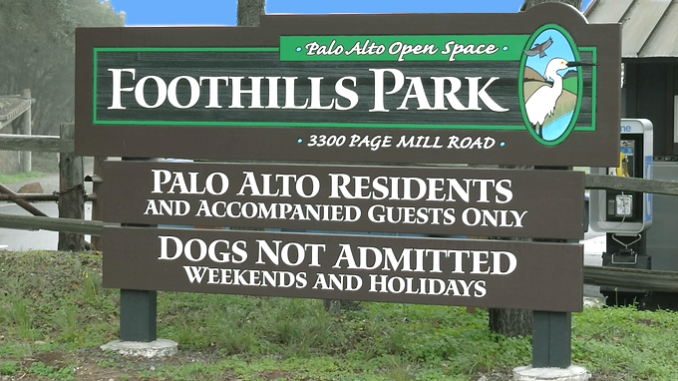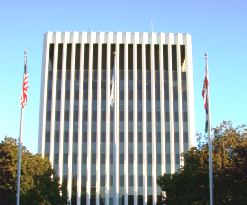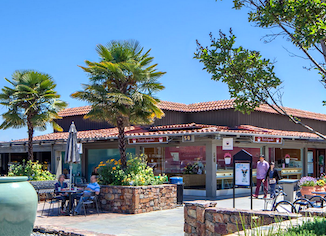
By the Daily Post staff
Palo Alto City Council, after getting hit by a lawsuit from the NAACP and ACLU, voted 5-2 tonight to drop the Palo Alto residents-only restriction on Foothills Park during a meeting where sparks flew between Mayor Adrian Fine and Councilwoman Lydia Kou.
In favor of dropping the restriction were:
Liz Kniss
Alison Cormack
Adrian Fine
Tom DuBois
Eric Filseth
Opposed were:
Lydia Kou
Greg Tanaka
Kou and Tanaka are facing re-election tomorrow. Both said they were siding with the majority of residents who wanted the resident only restrictions to remain.
Two recent informal surveys — one by Kou and the other by Friends of Palo Alto Parks founder Roger Smith — found that about 80% of residents said they wanted to keep the current residents-only policy for Foothills Park.
The ACLU filed a lawsuit against the city on Sept. 15 on behalf of the NAACP of San Jose/Silicon Valley and 10 residents of Palo Alto and nearby communities. The lawsuit alleges that the city’s Foothills Park restrictions violate the plaintiffs’ rights of freedom of movement, freedom of speech and freedom of assembly.
The ACLU called the park’s residents-only restriction a “legacy of the city’s history of racial discrimination.”
Lawsuit called a ‘bully maneuver’
Kou called the lawsuit a “bully maneuver” and she said the NAACP would later regret being associated with a lawsuit she said was frivolous.
She also said that the law firm the city had hired to handle the suit had represented the NAACP in the past, setting up a possible conflict of interest.
Tanaka said the public hasn’t bought into the idea of opening the park to all. He also said he wanted a second opinion from another lawyer about whether the city should settle.
City Attorney Molly Stump said the council’s actions will likely result in a settlement without the city being forced to pay the plaintiffs’ legal fees.
Stump also advised council members on what would happen if residents decided to repeal the decision at the ballot box. Residents would have 30 days to collect signatures for a referendum but could put an initiative on the ballot at any time in the future. Both would require the same number of signatures.
Fine accuses Kou
At the end of the meeting when Kou asked Fine to go public with his claim that she violated the Brown Act, the law regulating government meetings.
Fine said Kou communicated “purported confidential information, votes and attendance” at two closed sessions on Foothills Park. The Brown Act prohibits council members from disclosing what was said during a closed meeting.
Fine prefaced his remarks by saying his allegation against her wasn’t “personal.” She responded, “Of course it is personal.”
“Since you have proof of it, please make it public. I would like it publicized,” Kou said. “And if I need to apologize to the council, or I need to take, I don’t know, whatever it is, then I will. But I would like it publicized.”
Kou said she hadn’t divulged any information from the closed session.
Council changes direction
Last night’s decision represents a change in direction from the action the council took just three months ago, on Aug. 3. At that meeting, council voted 5-2 to launch a pilot program that would increase non-residents’ access to the park. Details of the pilot program were yet to be worked out. The council wanted to bring the Foothills Park issue back in 2022 to discuss placing a measure on the ballot, asking voters whether to open the park to non-residents.
Council’s action last night means the park could open to the public in as soon as Dec. 17. Initially, the city will limit the number of people in the park to 750 at any one time and, after 90 days, expand that cap to 1,000 people.
Council couldn’t decide on whether to rename the park the Foothills Nature Preserve. Council members voted to kick that issue back to City Manager Ed Shikada, who will likely send it to the Parks and Recreation Commission, which will consider the choices and make a recommendation to council.




Ok, what can we do to lift the ban on dogs in Foothills Park? For too long they’ve been discriminated against. They’re called “man’s best friend” but clearly they’re treated like second class citizens. My dog would enjoy chasing deer in the park if only the council would open it up to canine. Palo Alto, it’s time to shed our exclusionary past (as my dog sheds his summer fur).
What’s the over/under on the first gang tag on an oak tree?
Let’s put this on the ballot and recall the council members who thought it was a good idea to go against the wishes of the residents. Glad I voted for Kou.
Adrian Fine’s first allegation was that attendance at a close session is confidential.
1. Factually wrong. It is part of the public record — see the Action Minutes for that meeting that documents Fine’s arrival to 5:22pm and departure at 7:45pm: https://www.cityofpaloalto.org/civicax/filebank/blobdload.aspx?t=39730.23&BlobID=79047
2. Lydia Kou’s supposed breach of confidentiality was in an email sent 27 minutes *before* the scheduled start of the Council meeting, so it could *not* have come from the closed session.
Adrian Fine’s second allegation was Lydia Kou breached confidentiality by revealing that Council had voted in closed session to settle the lawsuit. This supposedly occurred in an email of Wednesday 28 October at 7:05 pm to her supporters. However, this action had been revealed implicitly by the Staff Report published the afternoon of Thursday 22 October 22 – 6 days before. The Staff Report was for a public vote by Council to settle and included a detailed presentation of changes to the existing ordinance — something that would not have been so specific without a vote of Council in the closed session. I published this trivial inference 39 hours before Kou’s email in my blog (https://www.paloaltoonline.com/blogs/p/2020/11/02/lie-down-roll-over-play-dead-city-attorney-and-manager-to-council).
Disclosure: I am a member of Lydia Kou’s campaign team.
Disclaimer: This is a personal statement based on my knowledge of the facts. It is not a statement from the Kou campaign, nor has it been influenced by other members of the Kou campaign.
Your report omitted that after Mayor Fine made his sudden accusations against council member Kou and was asked to explain publicly on what grounds these accusations were based, his response was that he had already sent the details to the media.
Kou’s supporters are sure quick to play the victim card for her.
Shame on those city council members who folded like a cheap suit on this bogus lawsuit. This decision should have been put to a vote of the residents of Palo Alto as the land was ultimately purchased by our citizens. This is a very slippery slope for other towns like ours where the naacp and aclu can file bogus lawsuits at will.
Council’s legal adviser should have told them that the racial discrimination claims would have been thrown out by a judge at the summary judgment stage. The only issue that would survive is whether the plaintiffs suffered economic damages. If they did, the amount would be de minimis considering there are public preserves that are open to them nearby. Tanaka was right to ask for a second opinion. Stump takes the most risk-adverse position in every case. In this case, she should have reviewed similar suits to see they haven’t been successful.
Now if council members want to open Foothills Park for political reasons — that they’re making a peace offering to Black Lives Matter protesters — they should have the guts to say that publicly rather than pretending they were motivated by a lawsuit. I would advise residents to repeal this vote at the ballot box.